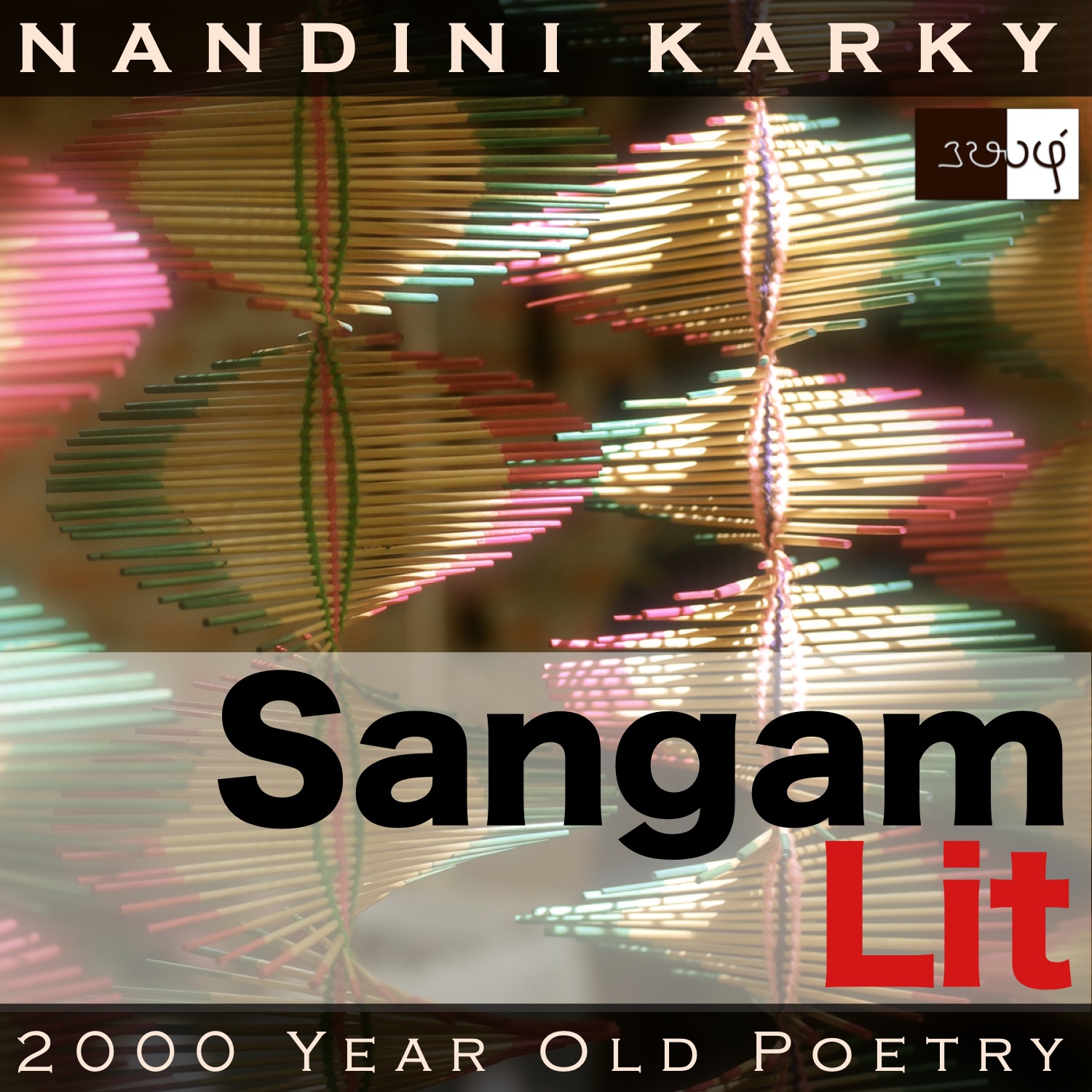Podcast: Play in new window | Download
Subscribe: Apple Podcasts | Spotify | Amazon Music | Android | iHeartRadio | TuneIn | RSS | More

In this episode, we observe a heated situation at a home, as depicted in Sangam Literary work, Natrinai 380, penned by Koodaloor Palkannanaar. The verse is situated in the farmlands of ‘Marutham’ and speaks in the voice of the confidante to the singer-messenger, refusing the man entry to his house.
நெய்யும் குய்யும் ஆடி, மெய்யொடு
மாசு பட்டன்றே கலிங்கமும்; தோளும்,
திதலை மென் முலைத் தீம் பால் பிலிற்ற,
புதல்வற் புல்லிப் புனிறு நாறும்மே;
வால் இழை மகளிர் சேரித் தோன்றும்
தேரோற்கு ஒத்தனெம் அல்லேம்; அதனால்
பொன் புரை நரம்பின் இன் குரல் சீறியாழ்
எழாஅல் வல்லை ஆயினும், தொழாஅல்;
கொண்டு செல்-பாண!-நின் தண் துறை ஊரனை,
பாடு மனைப் பாடல்; கூடாது நீடு நிலைப்
புரவியும் பூண் நிலை முனிகுவ;
விரகு இல மொழியல், யாம் வேட்டது இல் வழியே!
Opening with the rhyming phrase ‘நெய்யும் குய்யும்’ meaning ‘oil and smoke’, the verse gives no hint where it’s heading. ‘மாசு பட்டன்றே கலிங்கமும்’ means ‘the cloth has become stained’ and made me wonder about this connection between the word ‘Kalingam’ and its meaning – ‘cloth/attire’. The reason for this being ‘Kalingam’ is the historical name for the region around the current-day Indian state of ‘Odisha’. Could the ancient industry of weaving have given this region its name? To quote a modern-day example, ‘Madras’ is not only the old name of ‘Chennai’ but also, the current name for a type of fabric that came from this region and is used today to make pants and dresses. Could something similar have happened in the ancient world? That’s a question for historians and etymologists! Returning to the verse, ‘தீம் பால் பிலிற்ற’ meaning ‘squeezing sweet milk’ and ‘புதல்வற் புல்லி’ meaning ‘hugging the child’ reveal that this is a house, where an infant is newly born. ‘இன் குரல் சீறியாழ்’ sketches an ancient musical instrument, ‘a small lute with a sweet voice’. The phrase ‘புரவியும் பூண் நிலை முனிகுவ’ meaning ‘the horses dislike their tied-up state’ bring sounds of impatient trotting and neighing to our ears. The verse ends with ‘யாம் வேட்டது இல் வழியே’, meaning ‘it’s not what we desire’, and intrigues our curiosity!
The man and lady had been leading a married life when the man took to keeping the company of courtesans. The lady is angered by this action of the man. After a while, the man realises he must return to his home and his family life. Therefore, he sends his companion, the singer, as a messenger to the lady. The confidante who gives voice to the lady’s thoughts says to this singer-messenger, “Enveloped with oil and smoke, in addition to her skin, her clothes are stained too; As for her arms, which squeeze sweet milk from those spotted, gentle breasts, and cuddles her infant, they reek of birth. She is not fit for the one, whose chariot appears in the abode of women wearing pure and radiant jewels. And so, although you are an expert at wielding the sweet-voiced, little lute, with strings akin to gold, do not come seeking here. Take away, O bard, your lord of the cool river shores! Stop your singing in this home. Behold, the horses tied to the chariot for long are fretting too. Speak not useless words that we desire not to hear!” With these words, the confidante conveys to the singer and thereby, to the man that he is not welcome at the house.
Time to delve into the details! The confidante starts by mentioning oil and smoke and how these have stained the lady’s body as well as her clothes. To understand what this means, we have to walk along a little more. As promised, the confidante then reveals how as the lady’s arms have been squeezing milk from her spotted breasts and embracing her infant, they reek of birth. Taking a step back and connecting with other Natrinai poems, we know that the oil mentioned earlier is part of the post-natal treatment rendered to women then. We have seen how mustard oil is applied on the lady’s skin and perhaps, a pain-relieving massage is rendered too. As for the smoke mentioned, it could arise from burning herbs and other incense, perhaps, as a part of these caring rituals. The side-effect of these therapies is that the lady’s skin and clothes are stained. Adding to that, her arms reeks of the newborn. And so, the confidante adds, that the lady is not fit for one who is used to being with spick-and-span courtesans wearing well-crafted, shining jewels.
Although she describes the bard as an expert at extracting music from the lute with strings like gold, she stills bars him from singing at the lady’s house. She points to the horses that have been standing in wait and tells the bard that they seem to be fretting as they are tied to the chariot for long. Within this, is the hidden message that the man had disappeared to the courtesan’s place for a long time, and there, obviously, these horses were used to roaming free. Now, that they were standing in wait, they seem to be impatient with their harnessed state. After asking the bard not to speak any words for they are sure to be futile and also adding that the lady has no wish to hear them, the confidante concludes by commanding the bard to take the man away to where he came, the house of those radiant-jewelled courtesans he had chosen to be with. The song seems to hum to us that scents of birth and stains of healing are beautiful to eyes that see beyond, but not to one, who is lost in the dazzle of outer beauty. Here’s to eyes that always perceive true beauty, no matter the sweating brow or stained hands!




Share your thoughts...